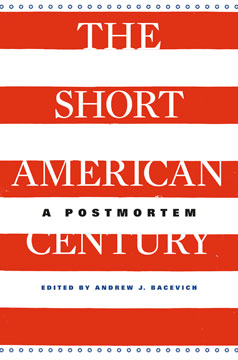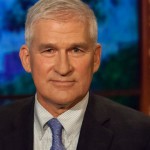 Excerpted from the final chapter of The Short American Century: A Postmortem
Excerpted from the final chapter of The Short American Century: A Postmortem
The problem for the United States today is that sanitizing history no longer serves U.S. interests. Instead, it blinds Americans to the challenges that they confront. Self-serving mendacities — that the attacks of September 11, 2001, reprising those of December 7, 1941, “came out of nowhere” to strike an innocent nation — don’t enhance the safety and well-being of the American people. If anything, the reverse is true. The Disneyfication of the Iraq War — now well advanced by those depicting “the surge” in Iraq as an epic feat of arms and keen to enshrine General David Petraeus as one of history’s Great Captains — might discreetly camouflage, but cannot conceal, the irreversible collapse of George W. Bush’s “Freedom Agenda,” predicated on expectations that the concerted application of American military power will democratize or at least pacify the Islamic world. The conviction that “the remoralization of America at home ultimately requires the remoralization of American foreign policy”— wars waged to incorporate dark quarters of the Islamic world into the American Century fostering renewal and revitalization at home — has likewise proven baseless and even fanciful. Abu Ghraib, Guantánamo, the revival of waterboarding and other forms of torture, and the policy of so-called extraordinary rendition have left the “incandescent moral clarity” that some observers attributed to U.S. policy after 9/11 more than a little worse for wear.
The argument here is not to invert the American Century, fingering the United States with responsibility for every recurrence of war, famine, pestilence, and persecution that crops up on our deeply troubled planet. Nor is the argument that the United States, no longer the “almighty superpower” of yore, has entered a period of irreversible “decline,” pointing ineluctably to retreat, withdrawal, passivity, and irrelevance. Rather, the argument, amply sustained by the essays collected in this volume, is this: To further indulge old illusions of the United States presiding over and directing the course of history will not only impede the ability of Americans to understand the world and themselves but may well pose a positive danger to both. Faced with a reality that includes, within the last decade alone,
• an inability to anticipate, whether the events of 9/11, the consequences of invading Iraq, or revolutionary upheaval in Egypt and elsewhere in the Arab world;
• an inability to control, with wars begun in Iraq, Afghanistan, and Pakistan, along with various and sundry financial scandals, economic crises, and natural disasters, exposing the limits of American influence, power, and perspicacity;
• an inability to afford, as manifested by a badly overstretched military, trillion dollar annual deficits, increasingly unaffordable entitlement programs, and rapidly escalating foreign debt;
• an inability to respond, demonstrated by the dysfunction pervading the American political system, especially at the national level, whether in Congress, at senior levels of the executive branch, or in the bureaucracy; and
• an inability to comprehend what God intends or the human heart desires, with little to indicate that the wonders of the information age, however dazzling, the impact of globalization, however far reaching, or the forces of corporate capitalism, however relentless, will provide answers to such elusive questions, Americans today would do well to temper any claims or expectations of completing the world’s redemption. In light of such sobering facts, which Americans ignore at their peril, it no longer makes sense to pretend that the United States is promoting a special message in pursuit of a special mission. Like every other country that confronts circumstances of vast complexity and pervasive uncertainty, the United States is merely attempting to cope. Prudence and common sense should oblige Americans to admit as much.
Electronically reproduced by permission of the publisher from The Short American Century: A Postmortem, edited by Andrew Bacevich. Cambridge, Mass.: Harvard University Press, Copyright © 2012 The President and Fellows of Harvard College.


